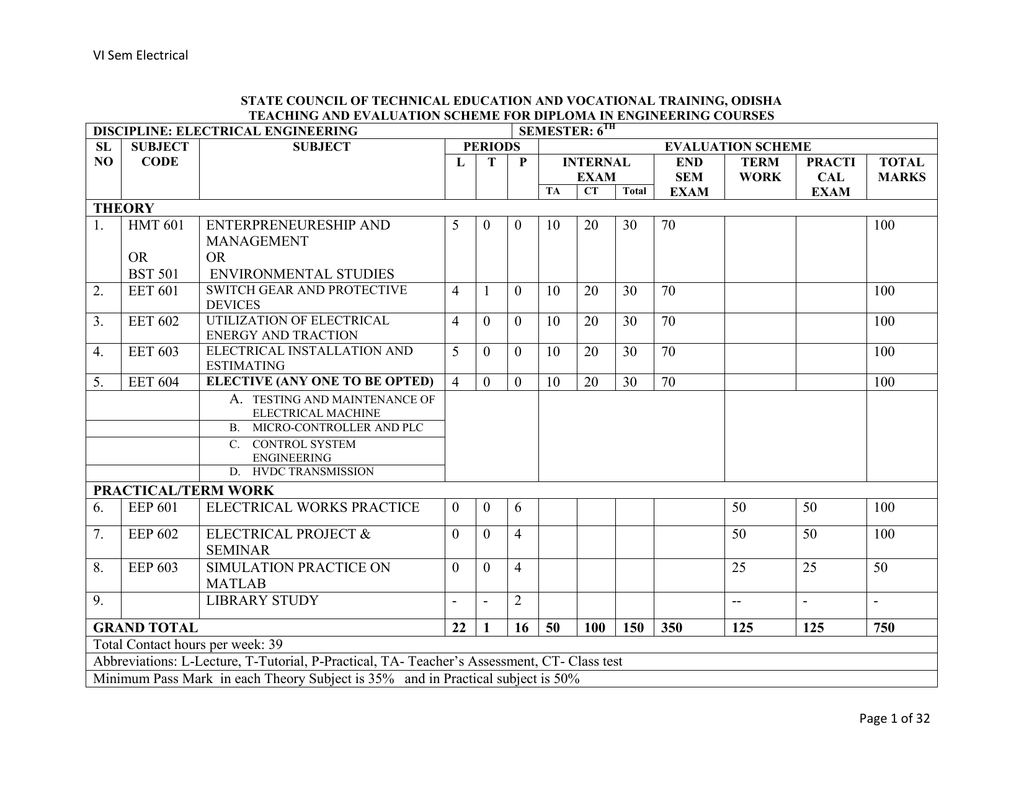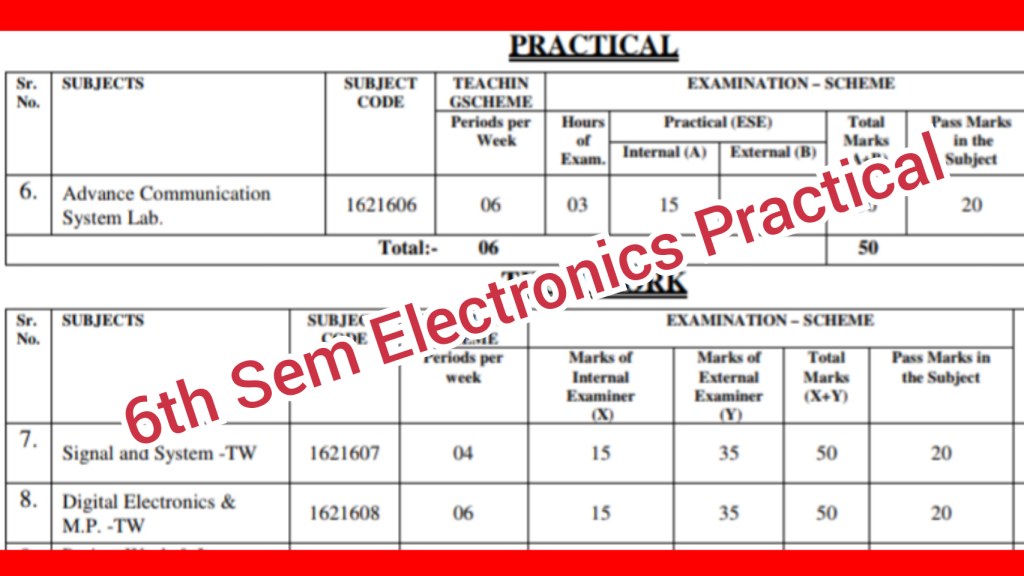Mastering Electronics In The 6th Semester: Dive Into The Complete Syllabus And Take Action Now!
Electronics 6th Semester Syllabus
Introduction
Welcome, Readers, to our comprehensive guide on the electronics 6th semester syllabus. In this article, we will dive deep into the various topics covered in the syllabus and provide you with all the essential information you need to excel in your studies. Whether you are a student, an aspiring engineer, or simply someone interested in electronics, this article will serve as a valuable resource for you. So, let’s get started!
Syllabus Overview
The electronics 6th semester syllabus is designed to offer students a thorough understanding of advanced electronic circuits, systems, and technologies. It covers a wide range of topics, including digital signal processing, microcontrollers, communication systems, and more. The syllabus aims to equip students with the knowledge and skills required to analyze, design, and implement complex electronic systems.
3 Picture Gallery: Mastering Electronics In The 6th Semester: Dive Into The Complete Syllabus And Take Action Now!



What is Electronics 6th Semester Syllabus?
Electronics 6th semester syllabus is a structured curriculum that outlines the subjects and topics that students will study during their 6th semester of electronics engineering. It provides a roadmap for students to follow and ensures that they cover all the essential concepts and skills required in the field of electronics.
Who Should Study Electronics 6th Semester Syllabus?
The electronics 6th semester syllabus is primarily designed for electronics engineering students who have successfully completed the prerequisite coursework. It is also beneficial for professionals in the electronics industry who want to update their knowledge and stay abreast of the latest advancements in the field.
When to Study Electronics 6th Semester Syllabus?
Students typically study the electronics 6th semester syllabus during their 6th semester of electronics engineering studies. The exact timing may vary depending on the academic calendar of the educational institution. It is advisable to refer to the course schedule provided by the institution for the accurate timing.
Where Can You Study Electronics 6th Semester Syllabus?

Image Source: studylib.net
The electronics 6th semester syllabus is offered by various universities and colleges that provide electronics engineering programs. Students can enroll in these institutions to pursue their studies and gain a comprehensive understanding of the subject. It is essential to choose a reputable institution that offers a well-rounded curriculum and experienced faculty.
Why Study Electronics 6th Semester Syllabus?
Studying the electronics 6th semester syllabus offers numerous benefits. Firstly, it provides students with in-depth knowledge and practical skills in the field of electronics, making them highly qualified for a wide range of career opportunities. Additionally, it allows students to stay updated with the latest advancements and technologies in the electronics industry, giving them a competitive edge in the job market.
How to Study Electronics 6th Semester Syllabus?
Studying the electronics 6th semester syllabus requires a systematic approach and dedication. Here are a few tips to make the most out of your studies:
Attend lectures and actively participate in class discussions.
Take detailed notes and review them regularly.
Engage in practical experiments and projects to apply theoretical concepts.
Join study groups or online forums to discuss and clarify doubts.
Utilize resources such as textbooks, research papers, and online tutorials.
Practice solving problems and solving sample question papers.
Seek guidance from professors and mentors whenever needed.
Advantages and Disadvantages of Electronics 6th Semester Syllabus

Image Source: blogspot.com
Like any educational program, the electronics 6th semester syllabus has its own set of advantages and disadvantages. Let’s take a look at them in detail:
Advantages
1) Broad Coverage: The syllabus covers a wide range of topics, providing students with a comprehensive understanding of electronics.
2) Practical Skills: Students gain hands-on experience through practical experiments and projects, enhancing their practical skills.

Image Source: ytimg.com
3) Industry Relevance: The syllabus is designed to align with the latest industry trends, ensuring students are well-prepared for the job market.
4) Career Opportunities: Completing the syllabus opens up various career opportunities in the electronics industry, including research, development, and manufacturing.
5) Networking: Studying the syllabus allows students to connect with fellow students, professors, and professionals in the field, expanding their professional network.
Disadvantages
1) Intense Workload: The syllabus may require significant time and effort to cover all the topics, especially for students with other commitments.
2) Challenging Concepts: Some topics in the syllabus may be complex and require a deeper understanding, posing challenges for students.
3) Limited Practical Resources: Availability of resources such as laboratories and equipment may vary, affecting the practical learning experience.
4) Rapid Technological Changes: The field of electronics is constantly evolving, and the syllabus may need periodic updates to keep up with the latest advancements.
5) Exam Pressure: The syllabus often culminates in examinations, which can create stress and pressure for students.
Frequently Asked Questions (FAQs)
1) Can I pursue a career in electronics without studying the 6th semester syllabus?
Absolutely! While studying the 6th semester syllabus provides a strong foundation and enhances your knowledge, it is not the sole determinant of your success in the electronics field. Practical experience, internships, and additional certifications can also play a significant role in shaping your career.
2) Are there any prerequisites for studying the 6th semester syllabus?
Yes, the electronics 6th semester syllabus is typically preceded by the completion of prerequisite coursework in earlier semesters. It is essential to have a solid understanding of basic electronics principles and concepts before diving into the advanced topics covered in the 6th semester.
3) How can I apply the knowledge gained from the syllabus in real-world scenarios?
The knowledge gained from studying the 6th semester syllabus can be applied in various real-world scenarios. From designing electronic circuits to troubleshooting complex systems, the practical skills developed during the course enable you to tackle real-world challenges effectively.
4) Are there any additional resources available to supplement the syllabus?
Yes, several additional resources are available to supplement the syllabus. Online platforms, textbooks, research papers, and industry publications can provide further insights, practical examples, and case studies to enhance your understanding and broaden your knowledge in specific areas of interest.
5) How can I stay updated with the latest advancements in the electronics field?
Staying updated with the latest advancements in the electronics field is crucial for your professional growth. Engaging in continuous learning, attending seminars and workshops, participating in online forums, and following reputable industry publications are effective ways to stay abreast of the latest trends and innovations.
Conclusion
In conclusion, the electronics 6th semester syllabus plays a vital role in shaping the knowledge and skills of electronics engineering students. It offers a comprehensive understanding of advanced electronic circuits, systems, and technologies, making students well-equipped for diverse career opportunities in the field. By diligently studying the syllabus, engaging in practical learning experiences, and staying updated with industry trends, students can pave the way for a successful and fulfilling career in electronics.
Remember, the journey of learning electronics doesn’t end with the syllabus. It is a continuous process that requires curiosity, perseverance, and a passion for exploring new horizons. So, embrace the challenges, stay curious, and keep pushing the boundaries of your knowledge!
Final Remarks
Disclaimer: The information provided in this article serves as a general guide to the electronics 6th semester syllabus. The specific syllabus content may vary depending on the educational institution and the academic year. It is advisable to refer to the official course materials and consult with professors for accurate and up-to-date information.
This post topic: Electronics


